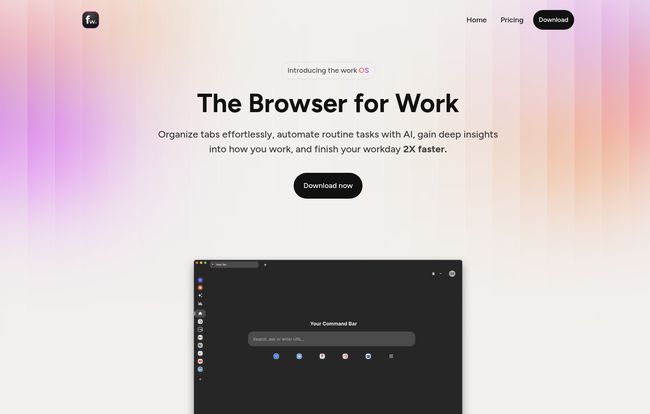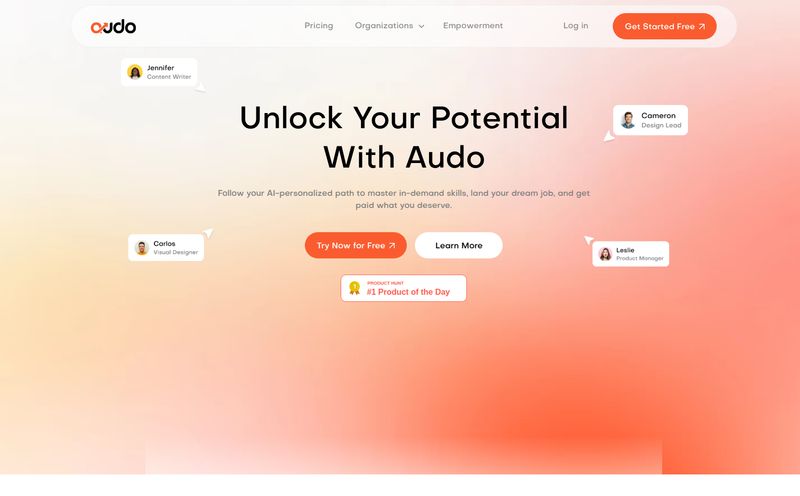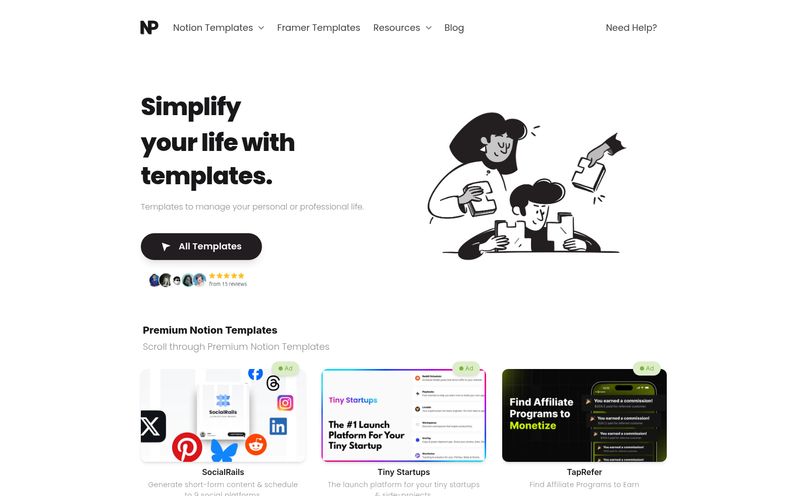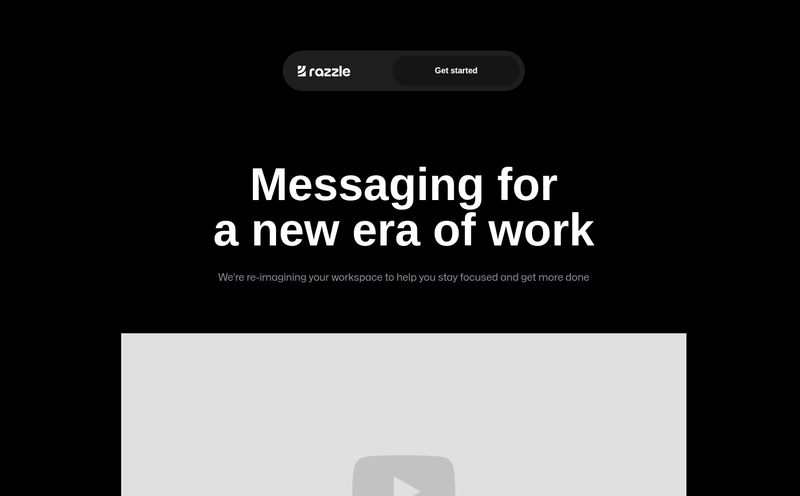If your browser tabs were physical objects, your desk would be declared a national disaster area. Mine would, anyway. We’ve all been there: a dozen tabs for one project, another window with personal stuff, Slack pinging away, your calendar yelling at you from another app, and a to-do list... well, that's on a sticky note somewhere under a coffee mug.
For years, we've been trying to duct-tape our digital lives together with a patchwork of apps and extensions. It’s exhausting. The constant context-switching isn’t just annoying; it’s a genuine productivity killer. Every time you jump from your document to your email to your task list, you lose a little piece of your focus. Academics at UC Irvine have been talking about this for years—it can take over 23 minutes to get back on track after a distraction. Ouch.
So when I heard about Floutwork, a browser that calls itself a "browser for work," my inner cynic and my desperate, over-caffeinated optimist had a little chat. A browser designed to prevent chaos? Sign me up. But does it actually deliver, or is it just another pretty app destined for my digital graveyard? I spent some time with it, and here’s what I found.
So, What Exactly is Floutwork?
First off, calling Floutwork just a “browser” feels a bit like calling a smartphone just a “phone.” It's built on that foundation, but it’s so much more. It’s an attempt to create a single, unified command center for your entire workday. Think of it less as a window to the internet and more as an OS for your productivity.

Visit Floutwork
It pulls your web apps, your tasks, your notes, your calendars (yes, multiple accounts), and your emails into one cohesive space. The whole idea is to stop the leakage—the focus leakage, the time leakage—that happens when your work is scattered across ten different tools. It’s an ambitious goal, and one I've seen other apps attempt and fail at. But Floutwork’s approach feels… different. More integrated.
The Key Features That Actually Got Me Excited
I’m pretty jaded when it comes to new tools, but a few things in Floutwork genuinely made me sit up and take notice. It's not just a collection of features; it's how they work together.
A Genuinely Unified Workspace
This is the core promise. Imagine having your Google Doc open on one side of the screen and your project task list right next to it. Not in a separate app, but in the same window. Then, pulling up your client emails without ever leaving that space. Floutwork’s split views and customizable workspaces make this a reality. You can create a dedicated “workspace” for each major project—say, ‘Q3 Marketing Campaign’—and have all the related apps, notes, and tasks bundled together. When you switch to that workspace, everything you need is right there. It’s like having a clean, organized desk for every single project you’re working on.
AI That Doesn’t Feel Like a Gimmick
I know, I know. Slapping “AI” onto a product is the 2024 equivalent of adding “.com” to a name in 1999. But here, it feels purposeful. Instead of just a generic chatbot, Floutwork has these little AI assistants for common workflows. Need to draft a social media post about your latest project? There's an assistant for that. Trying to write a tricky email or come up with some SEO keywords for a blog post? There are assistants for those too. It’s all powered by big names like OpenAI, so the quality is there. It feels less like a bolted-on feature and more like a helpful colleague who’s great at first drafts.
The Glorious, Uninterrupted Focus Mode
This might be my favorite part. When you start a task from your list, Floutwork can trigger a “Focus Mode.” It silences notifications, hides irrelevant tabs, and basically creates a digital cocoon around you and your work. It even tracks your time on the task. For someone like me who has the attention span of a goldfish in a room full of shiny things, this is a godsend. It's a simple, powerful way to force yourself to single-task, and it’s beautifully effective.
Let's Talk Money: Floutwork Pricing Plans
Alright, the all-important question: what’s this going to cost me? The pricing structure is actually quite flexible, which I appreciate. They seem to understand that not everyone has a corporate card to burn.
| Plan | Price | Best For |
|---|---|---|
| Free Forever | $0 / month | Casual users or those wanting to test the core features. It's surprisingly generous, with unlimited tasks, notes, and workspaces. But you're limited on things like connected accounts and tags. |
| Pro Monthly | $14 / month | Professionals who want to go all-in without a long-term commitment. You get unlimited everything, including AI credits and detailed productivity metrics. |
| Pro Yearly | $7 / month (billed annually) | The sweet spot. If you know this workflow is for you, this plan offers a massive 50% discount. It's a great deal for freelancers and serious knowledge workers. |
| Pro Lifetime | $89 (one-time) | The holy grail for bargain hunters. Pay once, and you get all Pro features forever, with two years of updates included. For a tool this comprehensive, that’s an absolute steal. |
(Note: Pricing is based on the information available at the time of writing. Always check their official pricing page for the latest details.)
The Not-So-Perfect Bits (Because Nothing Is)
I wouldn’t be giving you an honest review without pointing out a few potential downsides. Floutwork is good, but it’s not perfect.
For starters, there's a bit of a learning curve. It’s not steep, but because it does so much, you have to invest a little time to build the right habits and set up your workspaces. It's not a tool you can master in five minutes.
Also, it's built on the Electron framework. Now, for the non-nerds, that’s the same tech behind apps like Slack and VS Code. It’s great for cross-platform development, but it can sometimes mean the app is a little heavier on system resources than a native app. On my M1 Mac, it ran fine, but if you’re on an older machine, you might feel it.
And of course, while the free version is generous, the real magic—unlimited accounts, deep analytics, unlimited AI—is locked behind the Pro plan. That’s fair, but something to be aware of.
My Final Verdict: Is Floutwork Worth Your Time?
So, we circle back to the main question. Is Floutwork the magic bullet for productivity?
No, because no tool is. But it’s damn good. It’s one of the best attempts I’ve seen at solving the fundamental problem of digital work: fragmentation.
If you're a freelancer, a writer, a marketer, a student, or anyone who lives in their browser and feels the constant pain of tab overload and context switching, you owe it to yourself to try Floutwork. The free plan is more than enough to see if the workflow clicks with you. For me, it has the potential to replace a handful of other subscriptions, making that Pro Yearly or even the Lifetime deal look incredibly attractive.
It won't magically do your work for you, but it might just create the perfect environment for you to finally get it done. And in this age of constant distraction, that's a powerful thing.
Frequently Asked Questions
- What exactly is Floutwork?
- Floutwork is a productivity browser designed for focused work. It integrates your apps, tasks, notes, emails, and calendars into a single, organized workspace to minimize distractions and context-switching.
- Can I connect multiple email or calendar accounts?
- Yes, but you'll need a Pro plan. The free version allows for one calendar and one email account, while the Pro plans offer unlimited connections.
- How does the AI in Floutwork work?
- Floutwork integrates AI models like ChatGPT and Claude to provide contextual assistance. It offers specific AI helpers for tasks like writing emails, generating SEO content, creating task lists from goals, and more, right within your workflow.
- Is Floutwork available on both Mac and Windows?
- Yes, it's a cross-platform tool available for both macOS and Windows, so you can maintain a consistent workflow across different devices.
- Is my data secure with Floutwork?
- According to their website, they take security seriously. Since it's a browser, your data from web apps is handled as it would be in any other browser. For their own features like tasks and notes, you should review their privacy policy, but they seem to follow standard security practices.
Reference and Sources
- Floutwork Official Website
- "The Cost of Interrupted Work: More Speed and Stress" - Gloria Mark, Daniela Gudith, and Ulrich Klocke, University of California, Irvine



